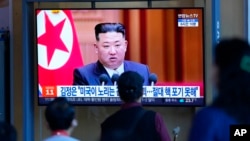North Korean leader Kim Jong Un on Thursday vowed his country will never give up its nuclear weapons or use them as a bargaining chip in negotiations, the latest sign of Kim’s hardened stance toward the United States and its allies.
The Supreme People’s Assembly, North Korea’s top legislative body, earlier this week passed a law further enshrining the country’s nuclear weapons status, the official Korean Central News Agency reported Friday.
North Korea will "never give up nuclear weapons and there is absolutely no denuclearization, no negotiation, and no bargaining chip to trade in the process," Kim said in a Thursday speech, according to KCNA.
Kim accused the United States of trying to bring down his government by pressuring it to surrender its nuclear weapons but said that policy was doomed to fail.
North Korea walked away from nuclear talks with the United States in 2019. It has since resumed missile tests, conducting a record number of launches this year. U.S. officials say the North has also prepared to conduct its seventh nuclear explosion.
According to the new law passed Monday, North Korea will retaliate with an immediate nuclear strike if the country is attacked by “hostile forces.”
The law also outlines several other scenarios in which North Korea would use its nukes, including an attack on state leadership or strategic nuclear forces, or to protect the existence of the state.
While the law says usage of nuclear weapons is a last resort, it described the weapons as essential to North Korea’s sovereignty and territorial integrity.
That kind of language is broadly in line with how North Korea has long described its nuclear arsenal, though at times Pyongyang has given mixed signals.
When asked in 2019, during a meeting with former U.S. President Donald Trump, if he was ready to denuclearize, Kim responded: “If I’m not willing to do that, I won’t be here right now.”
At their first meeting in June 2018, Trump and Kim signed a brief statement agreeing “to work toward complete denuclearization of the Korean Peninsula.”
Later, North Korean officials speaking in state-controlled media clarified that this agreement meant the United States should also remove “nuclear threats” from the region surrounding Korea.
The United States has about 28,000 troops in South Korea — a remnant of the 1950s Korean War, which ended in a truce rather than a peace treaty. There are also about 55,000 U.S. service members in nearby Japan.
In his Thursday speech, Kim said North Korea would only adjust its nuclear posture in response to the “political and military conditions of the Korean Peninsula,” as well as the global situation.
North Korea may have produced enough fissile material to build 45-55 nuclear weapons and might have assembled 20-30 warheads for delivery, according to the latest estimate published Thursday by the Bulletin of the Atomic Scientists, a nonprofit organization focused on global security.




